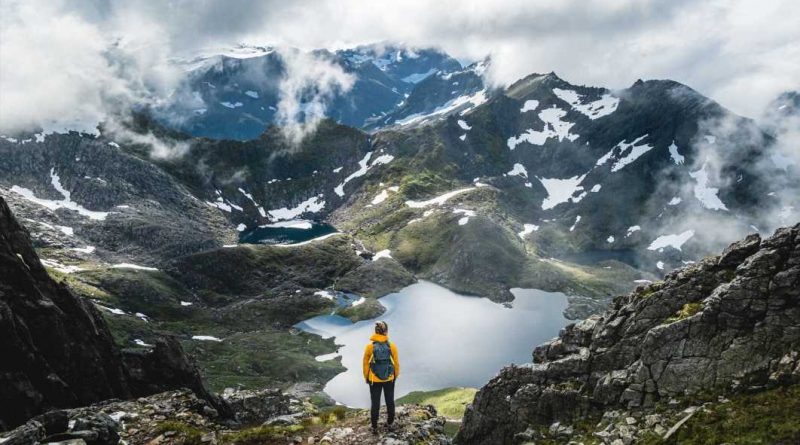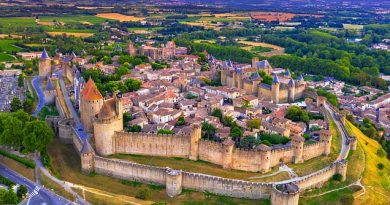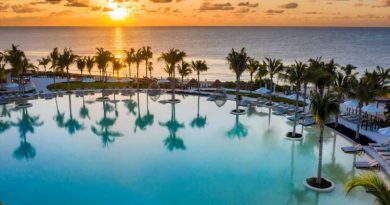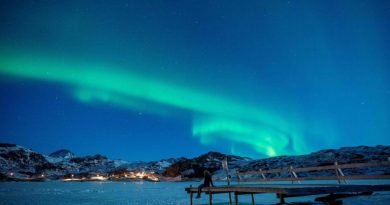6 Women from Around the World on What Wellness Means to Them
Over the past decade or so, the wellness industry has become a huge commercial business here in the U.S. Scroll through your Instagram feed on any given day, and you’ll likely see all sorts of lotions, potions, tinctures, and tonics that promise to deliver your well-being directly to your doorstep. There are even entire hotels and resorts dedicated to wellness now, with health amenities like nutrition consultations and customized sleep programs that go far beyond the classic spa experience.
But true health and happiness isn’t something you can always check into or buy with one click—it’s about the way you live your life every day. And while it may be trendy right now, it’s certainly not a trend; people around the world have been practicing wellness in a variety of ways for centuries, everywhere from Jamaica, Norway, and Hawai’i, to Japan, India, and Brazil.
In the spirit of my new book, Destination Wellness, I spoke to six women from six different countries about what well-being means to them. The takeaway? Actual, genuine wellness is a far cry from the homogenous images of overpriced grain bowls you see all over the place. Read on for a globally-inspired guide to better living—and a reminder that, in the end, travel is the best teacher of them all.
Wellness is…channeling the aloha spirit every day
Kapua Browning, founder and CEO of Honua Hawaiian Skincare, a Hawaiian skincare company based in Santa Rosa, California, and Honolulu, Hawaii
“Growing up on O‘ahu in Hawai‘i, I was lucky enough to be enveloped by natural beauty every day, and I could easily experience a sense of wellness bliss just by being in nature. Playing in waterfalls, body surfing the shore break, pulling kalo from the mud, and just laying out and soaking up some Hawaiian sun are some of my favorite wellness tips. But when I had to leave my beloved Hawai‘i behind due to economic hardships, I embraced an even more powerful wellness tactic: channeling the aloha spirit every day. Now, the key to my well-being is living with true aloha in my heart and incorporating it into everything I do throughout my life.
To be clear, aloha does not just mean hello and goodbye—the real meaning is connection and love. Broken down by letter, it incorporates many philosophies: Akahai (kindness, to be expressed with tenderness); Lokahi (unity, to be expressed with harmony); Oluolu (agreeable, to be expressed with pleasantness); Haahaa (humility, to be expressed with modesty); Ahonui (patience, to be expressed with perseverance).
As a skincare line owner, people always assume that I would recommend my products before anything else, but I am a firm believer in the idea that beauty comes from the inside out. Living aloha for me starts by filling my cup with self-love through being kind and patient with myself. That way, I can then share my aloha with others. While I stand by my ‘olena (turmeric) and my noni and my ni‘oi and my kukui—they are all amazing skin-benefiting plants—true well-being is about making that daily connection with the mind and the heart and reminding myself to radiate positive energy into my work, my creations, and everyone I come into contact with. Aloha is the key.”
Wellness is…building jeong by strengthening your relationships
Charlotte Cho, New York City-based founder of Soko Glam, an online marketplace for Korean beauty products, and author of The Little Book of Skin Care and the forthcoming book The Little Book of Jeong
“My day-to-day wellness philosophy is rooted in the Korean cultural concept of jeong, something I learned about while living in Korea. This word describes a deep and emotional bond to the people, places, and things that matter most—one that is only cultivated by taking the time to develop those connections. Ultimately, jeong is about going deeper: deeper into our relationships with others, with the world around us, and with ourselves. Doing so certainly takes time, but I truly believe that being intentional about the connections you make is the foundation of what makes us well in this short life.
I also believe that building jeong—both with others and yourself—can be a part of everyone’s wellness journey. Building it with others is about focusing on the deep connections in your life, being vulnerable with your community, and giving without expecting anything in return—all of which will lead to increased empathy, generosity, and understanding. Building personal jeong, on the other hand, is about investing in the emotional connection you have with yourself. For me and many others, this is where Korean beauty (K-beauty) may come in.
While many people may think that K-beauty is about following a multi-step skincare routine, it’s more than that—it’s about using the ritual as a moment of self-care every day. As a new mother during the pandemic, I relied on my 15 minutes of skin-pampering “me time” in the comfort of my bathroom more than ever—it became a true lifesaver. Society often tells us that things like money and fame will lead to happiness, but I deeply believe that unlocking the idea of jeong and applying it to your days will bring much more fulfillment.”
Wellness is…spending as much time outside as possible, the friluftsliv way
Helga Synnevåg Løvoll, associate professor of friluftsliv at Volda University College in Møre og Romsdal, Western Norway
“In Norway, we associate health with nature. The two are very integrated. I’m especially aware of this as a professor of friluftsliv, our cultural philosophy that celebrates outdoor living. We try to spend as much time in fresh air as we can here in Norway—we even put our babies to sleep outside in strollers so that they grow up with the idea that it’s safe to sleep outdoors.
But friluftsliv is more than just a love for nature. It’s about intentionally seeking out that time outdoors so that you can have a deeper connection with the earth—and with yourself. Part of the friluftsliv spirit is making a point to walk outside every day, whether that’s walking to your job, walking to do your various errands, or walking just to walk. Another part is making a point to get out into deeper nature every so often, far enough away so that you are not disturbed by urban light.
Personally, I need that distance in deep nature to refresh my being. That’s wellness to me. Some people in Norway associate friluftsliv with fancy outdoors equipment, or as a competitive sport when you hike in the mountains—but not me. The physical challenge is part of it, but it’s mostly about the experience of just being. It’s about chasing the feeling you get when you are sleeping in your sleeping bag somewhere in nature, preferably alone, and you get out of the tent at night, look at the stars, and just get struck. It’s awe; it’s wonder; it’s freedom. And it’s very spiritual. You go through a process and you come out on the other side, somewhere else than you were before. ”
Wellness is…living an Ital life by honoring Mother Nature
Empress Thandi Wise, founder of Wise Wellness Yoga Center & Health Food Store in Treasure Beach, Jamaica
“As a Rastafari woman, I believe that wellness is about living an Ital life. And when Rastafari say Ital, we’re talking about living a plant-based life. About being self-sustained. About planting and picking and having a front garden and living in alignment with the connection to our food source.
Ultimately, wellness to me is about living harmoniously. I’ve always said: Grow what you eat and eat what you grow. To me, that’s true well-being. It’s about doing whatever you need to do to be able to say: My livelihood and my sustainability is my responsibility. There’s a certain peace of mind that comes when you’re able to take care of yourself without relying on society for your food; it alleviates stress.
Of course, not everyone has a backyard, and if that’s the case, it’s about asking yourself: How can I make what I currently have work for me? How can I turn this space that I’m living in into something that completely serves me and my family? Maybe it’s about putting more windows in to bring the sunlight indoors. More often than not, we already have everything that we need to sustain us. Just think of how Indigenous cultures lived for many centuries in a harmonious state—they’ve done it and they’re a good reminder that we can do it, too. That’s why ‘wellness’ today cannot become a coined word, or just something commercial that we use as a cliché—it has to be a pivotal part of our daily lives without apology. We need to get back in harmonious balance with the planet and all of the dwellings.”
Wellness is…embracing our full selves through the lens of kintsugi
Candice Kumai, New York City-based director, writer, and author of multiple books, including Kintsugi Wellness
“To me, wellness is about embracing kintsugi, the Japanese art of repairing broken objects of desire. Rather than throwing something away because it’s broken, kintsugi focuses on repairing it to make it even more beautiful than it was before, sealing it with lacquer and dusting the cracks with a gold powder. This is a perfect metaphor for our lives in reflection, especially after the pandemic.
Like so many around the world, I lost the majority of my income and work in 2020. I had to move out of my apartment, find a smaller place, and let go of dozens of team members. All I could do was rely on kintsugi and share how it could help others too. I focused on being resilient, on repairing myself through a commitment to better self-care and better financial health for my business. I went inward, prioritizing rest, spirituality, workouts, less caffeine, more sleep, and meditation five times a week for 30 to 40 minutes a day.
Kintsugi is the self-care we all need and deserve—and we shouldn’t even have to wait until we feel broken to give ourselves this gift. Golden repair teaches us to love and embrace our whole selves, flaws and imperfections included. If anything, now that I’m in my late 30s, I’ve become even more in tune with my full authentic self, with what I really need to feel whole: spirituality, love, a sense of companionship, community, a sense of purpose (ikigai), and as of late, respect. A voice. To be felt, seen, and heard as an equal. To me, well-being is seeking out all of those things—and embracing the cracks that show up along the way.”
Wellness is…having a sense of purpose
Valerie Obaze, founder and CEO of R&R Luxury, a plant-based African skincare brand based in Accra, Ghana
“People typically think that wellness is the spa or the beach or something like that, but I’m not one of those super bohemian Earth girls with my hands in the soil. For me, the first step of wellness is being self-aware. Knowing what makes me sad and what affects my mood in a certain way makes it easier for me to be in my happy place—because I know what to stay away from.
Beyond mental wellness and creating boundaries to protect myself, I think that wellness is about having a sense of purpose. As the founder of my own beauty company, mine is sharing the goodness of Africa with the rest of the world. Africa is a beautiful continent with so many healing plants and ingredients to offer, and if I can get some young lady who lives in some remote province in, I don’t know, America somewhere, to use black soap on her skin, then I’ve done my job—because you can’t get African black soap anywhere but Africa. If she’s experiencing a bit of Africa in her everyday wellness routine, then that’s my own personal definition of wellness because it’s extremely fulfilling for me.
It’s about changing the narrative of how people see Africa and what the expectations of Africa are, and showing and sharing images about what we’re doing that opens peoples’ eyes up to see that it’s maybe not what they thought. It’s also a chain reaction, because I know that my business is also creating jobs for our booming youth population, and impacting the women who make the raw ingredients, like shea, in a positive way. Knowing that I could possibly change their trajectory gives me a huge sense of fulfillment every day. It makes me really happy.”
‘Destination Wellness’ by Annie Daly
$21.00, Bookshop
Source: Read Full Article



